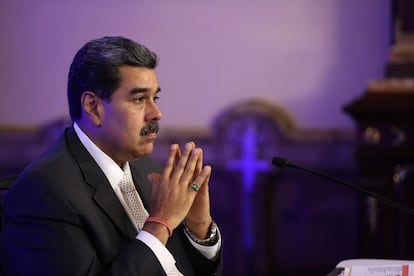International Criminal Court green-lights investigation into human rights violations in Venezuela
The government of Nicolás Maduro has attempted to halt the process, which Caracas claims is being driven by Washington, through various judicial resources


Human rights campaigners have been waiting for weeks for a response from the International Criminal Court (ICC) over proceedings against Venezuelan President Nicolás Maduro in The Hague for allegations of serious human rights violations that could constitute crimes against humanity. After continuous back-and-forth with the Venezuelan government and following a visit to the country by prosecutor Karim Khan to set up a technical assistance office in Caracas, the ICC has now ordered the investigation to move forward.
The Pre-Trial Chamber of the ICC published the conclusions of its analysis of repeated requests from the Venezuelan Prosecutor’s Office to suspend the process under the argument that the Venezuelan justice system would be taking over the case. “Venezuela is not investigating the factual allegations underlying the contextual elements of crimes against humanity,” the court stated. In addition, the ICC points out that there have been periods of investigative inactivity that they consider inexplicable and that the inquiries have only focused on low-ranking officers and not on the entire chain of command.
“We have a clear intention to do justice in our country, without a transnational entity doing it for us, and we are demonstrating it,” said Venezuelan prosecutor Tarek William Saab less than a month ago, during Khan’s third visit to the country, during which the installation of the technical cooperation office was agreed upon. In response to the latest step taken by the ICC, the Venezuelan Foreign Ministry expressed its disagreement. Under the Maduro administration’s argument, since the beginning of the process in 2018, the ICC has encouraged and contributed to a strategy with political purposes “of regime change” in Venezuela, allegedly driven by the United States, which has traditionally been enemy number one in the eyes of a section of Chavismo, but with which Caracas has reinitiated dialogue over the past year.
Judges Péter Kovács, Reine Adélaïde Sophie Alapini-Gansou and María del Socorro Flores Liera examined the observations of the Venezuelan authorities, as well as 1,875 documents collected by the ICC Victims Participation and Reparations Section that gather the testimonies of more than 8,000 victims of torture, arbitrary detentions, sexual violence, forced disappearances and extrajudicial executions committed since 2014 in the context of anti-government demonstrations and as part of a policy of politically motivated persecution.
At the end of 2021, the ICC announced the completion of its preliminary examination, the first phase in determining the opening of an investigation. The Maduro government, through various legal maneuvers, tried to halt the process but only succeeded in putting it on hold for a few months. Those recourses appear now to be exhausted, although Caracas has announced that it will appeal against the ruling, a move that has little chance of bearing fruit according to some analysts.
The ICC decision comes at a sensitive time for Maduro, who has resumed diplomatic relations with much of the world in the run-up to the 2024 presidential elections, for which the Venezuelan leader is attempting to improve his public image. Although the ICC investigation was initiated in 2018 by the former presidents of several countries in the Latin America region who had been critical of Chavismo — Colombia’s Iván Duque, Argentina’s Mauricio Macri, Chile’s Sebastián Piñera and Paraguay’s Mario Abdo Benítez — NGOs have been instrumental in documenting the case.
The Latin American political spectrum has since shifted again and accusations of human rights violations committed by the Maduro government have taken a back seat, at least in terms of diplomatic relations, while human rights campaigners in Venezuela have pushed for justice in international institutions. This has led the pro-Maduro Venezuelan parliament to launch its own campaign against these organizations. A few months ago, a law was passed restricting their operations and access to international funding.
Human rights NGOs such as Defiende Venezuela and Acceso a la Justicia have described the ICC decision as a victory for the victims. Venezuela ratified the Rome Statute, the founding treaty of the ICC, in 2000. This is the first time that an investigation has been opened against an incumbent government and the first time in this instance that an investigation has been opened in a Latin American country. It is also unprecedented for states parties to the Rome Statute — in this case Colombia, Argentina, Chile, Peru, Paraguay, and Canada — to invoke the treaty against another signatory. Following Tuesday’s decision, another step has been taken on the long road to proving alleged crimes against humanity and the possible punishment of high-ranking government figures as those responsible.
Sign up for our weekly newsletter to get more English-language news coverage from EL PAÍS USA Edition
Tu suscripción se está usando en otro dispositivo
¿Quieres añadir otro usuario a tu suscripción?
Si continúas leyendo en este dispositivo, no se podrá leer en el otro.
FlechaTu suscripción se está usando en otro dispositivo y solo puedes acceder a EL PAÍS desde un dispositivo a la vez.
Si quieres compartir tu cuenta, cambia tu suscripción a la modalidad Premium, así podrás añadir otro usuario. Cada uno accederá con su propia cuenta de email, lo que os permitirá personalizar vuestra experiencia en EL PAÍS.
¿Tienes una suscripción de empresa? Accede aquí para contratar más cuentas.
En el caso de no saber quién está usando tu cuenta, te recomendamos cambiar tu contraseña aquí.
Si decides continuar compartiendo tu cuenta, este mensaje se mostrará en tu dispositivo y en el de la otra persona que está usando tu cuenta de forma indefinida, afectando a tu experiencia de lectura. Puedes consultar aquí los términos y condiciones de la suscripción digital.








































